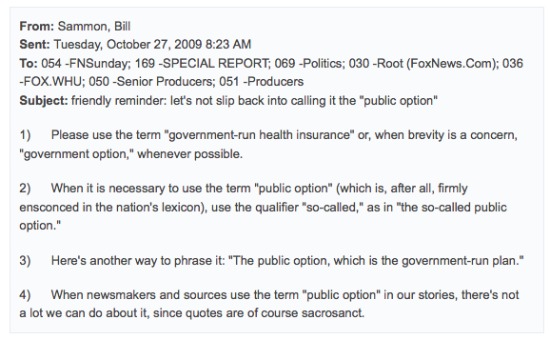‘Tis the season to be leaking.
Media Matters is reporting today that it has acquired e-mails sent by Fox News Washington editor Bill Sammon to network staff last October directing them not to use the phrase “public option” when discussing the Senate health care bill. What was his phrasing of choice? “Government-run insurance option,” “government option,” or “the public option, which is the government-run plan.” And if any Fox Newsers did use the phrase “public option,” they were advised to throw in a “so-called” with it. Reporter Ben Dimiero writes that the leaked e-mail “is the clearest evidence yet that Sammon is aggressively pushing Fox’s reporting to the right—in this case by issuing written orders to his staff.”
Here is the e-mail from the Media Matters site:

Dimiero notes that Sammon’s e-mail on the “so-called public option” had an impact—on the Special Report broadcast the day the e-mail was sent, “Fox journalists made no references to the ‘public option’ without using versions of the pre-approved qualifiers outlined in Sammon’s and Clemente’s emails.” A further leaked e-mail reveals VP for News Michael Clemente thought “the public option, which is the government-run plan,” was best wording.
The implication of the e-mail request is that, despite Fox protests, the line between its prime time conservative commentators and its daytime “fair and balanced” newscasts may be blurrier than it would admit. The e-mails give the impression that the network thinks politically, at all hours of the day.
Nobody from Fox responded to Media Matters’s request for comment, but Howard Kurtz at the Daily Beast—who seems to be Fox’s go-to man whenever fire breaks out or they want to ignite one of their own—got the goods.
Sammon said in an interview that the term “public option” “is a vague, bland, undescriptive phrase,” and that after all, “who would be against a public park?” The phrase “government-run plan,” he said, is “a more neutral term,” and was used just last week by a New York Times columnist.
“I have no idea what the Republicans were pushing or not. It’s simply an accurate, fair, objective term.”
(A quick Google search shows the Times did use the term at least once recently, in a mid-November piece Matt Bai wrote on Sarah Palin; though he used it to describe a reform plan Howard Dean proposed in 2003, which did not include a “government-run plan.”)
Sammon is both right and wrong here. “Public option” is a “vague, bland, undescriptive phrase,” no doubt. That’s part of the reason so few Americans understood what it was during the debate on health care reform—a Vanity Fair/60 Minutes poll published in the magazine’s January issue revealed sixty-six percent of people said they could not confidently explain what the “public option” is to someone who did not know. Personally, I could give it a try, but as long as we’re talking words, “confident” would not be the best one to describe me doing so.
And there is technically nothing wrong with calling the “public option” government-run or regulated. It will be. As a qualifier to distinguish it from the British NHS, which is also government-owned and funded, it might even be a helpful distinction to make to include such phrasing. The more interesting debate to be had in light of these e-mails, rather than getting ourselves worked up about some unsurprising Fox News spin, would be to prod and poke at the confusing concept of the “public option” to find what might be a better qualifier, or description, with which to pair it. One which can connote to readers a little more of what it is that is coming their way. (And I’d be interested to see similar correspondence on phrasing from liberal sites/TV shows.)
Still, Sammon is clearly twisting things when he tells Kurtz the suggested rephrasing is more “objective,” or “more neutral,” than “public option,” which by its very vagueness, earns a kind of neutrality. This is partly because while it is technically correct to describe the public option as “government-run health insurance,” the network has spent two years vilifying the government as a corrupt, overreaching entity eager to impose death panels and socialism on the public. The “g word” is employed to evoke a particularly negative reaction.
Thus, while both Fox and the Times may describe something as government-run, they can mean different things and invoke different reactions in their audiences. One may be objective use; the other far more pointed. Whether Sammon was taking advantage of his network’s redefinition, or actively redefining it furthe here, “neutral” is a stretch.
Joel Meares is a former CJR assistant editor.
